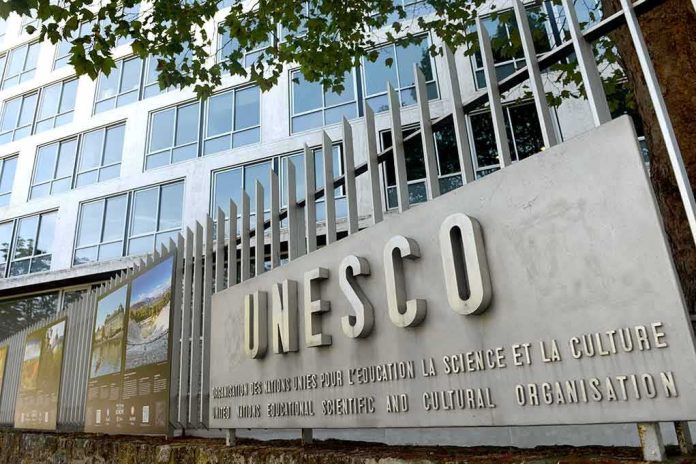
As the United States once again announces its withdrawal from UNESCO, the global community is left questioning the implications for international cooperation and cultural diplomacy.
At a Glance
- The US will officially withdraw from UNESCO by December 31, 2026.
- China criticizes the US move as irresponsible for a major power.
- The decision highlights ongoing disputes over Palestine’s recognition.
- The US cites UNESCO’s alignment with SDGs as contrary to American interests.
US Withdrawal and Its Implications
On July 22, 2025, President Donald Trump announced the United States’ decision to withdraw from UNESCO by the end of 2026. This decision marks the third time the US has exited this United Nations institution, known for promoting global collaboration in education, science, and culture. The administration cited UNESCO’s “divisive social and cultural causes” and its alignment with the UN’s Sustainable Development Goals (SDGs) as reasons for the withdrawal. Critics argue this move demonstrates a retreat from multilateral engagement, while supporters see it as a necessary stand against international organizations that they perceive as politically biased.
China, positioning itself as a champion of global cooperation, was quick to condemn the US decision. A spokesperson from the Chinese Foreign Ministry described the withdrawal as behavior unbecoming of a responsible major power. This criticism underscores the growing geopolitical tensions, as China seeks to fill the void left by the US in international institutions. Meanwhile, UNESCO Director-General Audrey Azoulay expressed deep regret over the US decision, emphasizing the importance of American participation in fostering global dialogue and understanding.
Historical Context and Ongoing Disputes
The US has had a tumultuous relationship with UNESCO, withdrawing previously in 1984 and 2017 over ideological and political disagreements. A significant point of contention has been UNESCO’s recognition of Palestine as a full member state in 2011, which led to the US halting its funding in accordance with domestic laws. The Trump administration’s latest decision to withdraw again underscores the unresolved tensions surrounding Palestine’s membership and its implications for US foreign policy.
The Biden administration briefly reversed the 2017 withdrawal in 2023, emphasizing the importance of multilateralism and global cooperation. However, the current administration’s stance reflects a return to prioritizing national interests over international commitments. The ongoing debate over UNESCO’s role and its alignment with certain international agendas continues to polarize opinions within the US and beyond.
Impact on Global Cooperation and US Influence
The US withdrawal from UNESCO has significant implications for international cooperation. As a major funder and influential member, the US has historically played a critical role in shaping UNESCO’s initiatives, including World Heritage site designations and educational programs on the Holocaust. Without US funding, UNESCO faces potential financial strain, which could hinder its ability to execute global projects effectively.
The withdrawal also represents a setback for US soft power and leadership in international affairs. By disengaging from UNESCO, the US risks diminishing its influence over global cultural and educational initiatives. This vacuum provides an opportunity for other nations, particularly China, to increase their sway within UNESCO and the broader UN system. The potential shift in power dynamics raises questions about the future of multilateral governance and the US’s role on the world stage.
Perspectives and Reactions
Reactions to the US withdrawal are mixed. UNESCO and UN officials have uniformly expressed regret, highlighting the crucial role of US participation in fostering multilateral collaboration. Conversely, US officials defend the decision as a necessary measure to protect national interests and counter perceived ideological agendas within UNESCO.
Critics argue that repeated US withdrawals undermine its credibility and influence in international organizations, while supporters maintain that disengagement is essential to resist politicized or biased institutions. The debate reflects broader trends of US disengagement from multilateral frameworks, raising concerns about the future of international cooperation and governance.







